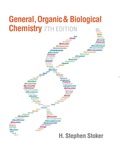
Concept explainers
Interpretation:
The alkane that is gas at room temperature has to be identified from the given set of options.
Concept Introduction:
Organic compounds are represented shortly by the molecular formula and structural formula. Each and every compound has its own molecular formula. Compounds can have same molecular formula but not same structural formula.
Alkanes and cycloalkanes are hydrocarbons. They are nonpolar molecules. Water is a polar molecule. Therefore, alkanes and cycloalkanes do not get solubilized in water. In other words, alkanes and cycloalkanes are insoluble in water.
Regarding density, alkanes and cycloalkanes have density lower than water. When alkanes and cycloalkanes are mixed with water, two layers are formed which is a result of insolubility. Alkanes and cycloalkanes are present on top of water layer which is due to lesser density.
Boiling point of alkanes and cycloalkanes increase with an increase in carbon‑chain length or the ring size. When considering the continuous‑chain alkanes, the boiling point of alkanes increases about
When branching happens in the carbon chain, it lowers the boiling point of alkanes. In simple words, unbranched alkanes have more boiling point than branched alkanes with the same number of carbon atoms.
Cycloalkanes have more boiling point compared to noncyclic alkanes with the same number of carbon atoms. This is due to the more rigid and more symmetrical structures that occur in cyclic systems. Cyclopropane and cyclobutane are gases at room temperature. Cyclopentane to cyclooctane are liquids at room temperature.
Want to see the full answer?
Check out a sample textbook solution
Chapter 12 Solutions
EBK GENERAL, ORGANIC, AND BIOLOGICAL CH
- 6.15PM Sun Mar 30 K Draw the major product of this reaction. Include any relevant stereochemistry. Ignore inorganic byproducts. Problem 1 of O H [PhзPCH2CH3]*C|¯ NaH Drawing > Q Atoms, Bonds and Draw or tap a nearrow_forward8:17 PM Sun Mar 30 Draw the major product of this reaction. Ignore inorganic byproducts. HSCH2CH2CH2SH, BF3 Probler Drawing Ato Bonds Clarrow_forwardpresented by Mr L How the coprion. (Il Done in no wraction, dew the starting redential) доarrow_forward
- 8:16 PM Sun Mar 30 K Draw the major product of this reaction. Ignore inorganic byproducts. Proble 1. CH3MgBr 2. H3O+ F Drawingarrow_forwardо но оarrow_forwardName the major organic product of the following action of 4-chloro-4-methyl-1-pentanol in neutral pollution 10+ Now the product. The product has a molecular formula f b. In a singly hain, the starting, material again converts into a secule with the molecular kormula CIO. but with comply Draw the major organic structure inhalationarrow_forward
- Macmillan Learning Alcohols can be oxidized by chromic acid derivatives. One such reagent is pyridinium chlorochromate, (C,H,NH*)(CICTO3), commonly known as PCC. Draw the proposed (neutral) intermediate and the organic product in the oxidation of 1-butanol by PCC when carried out in an anhydrous solvent such as CH₂C₁₂. PCC Intermediate OH CH2Cl2 Draw the intermediate. Select Draw Templates More с H Cr о Product Draw the product. Erase Select Draw Templates More H о Erasearrow_forwardIf I have 1-bromopropene, to obtain compound A, I have to add NaOH and another compound. Indicate which compound that would be. A C6H5 CH3arrow_forwardProvide the reagents for the following reactions.arrow_forward
- If I have 1-bromopropene, to obtain compound Z, I have to add two compounds A1 and A2. Indicate which compounds are needed. P(C6H5)3arrow_forwardDraw the major product of this reaction. Ignore inorganic byproducts. Assume that the water side product is continuously removed to drive the reaction toward products. O CH3CH2NH2, TSOH Select to Draw >arrow_forwardPredict the major organic product(s) for the following reaction.arrow_forward
 Organic And Biological ChemistryChemistryISBN:9781305081079Author:STOKER, H. Stephen (howard Stephen)Publisher:Cengage Learning,
Organic And Biological ChemistryChemistryISBN:9781305081079Author:STOKER, H. Stephen (howard Stephen)Publisher:Cengage Learning, General, Organic, and Biological ChemistryChemistryISBN:9781285853918Author:H. Stephen StokerPublisher:Cengage Learning
General, Organic, and Biological ChemistryChemistryISBN:9781285853918Author:H. Stephen StokerPublisher:Cengage Learning

